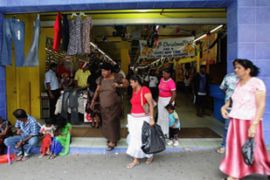Coup turning Fiji economy sour
Sugar industry faces collapse if EU cancels aid package.

Published On 13 Dec 2006
The coup has already had an impact on other sectors of the economy.
Tourism, which employs 50,000 people directly and indirectly and accounts for 49 per cent of Fiji’s foreign exchange earnings, has plunged, with arrivals falling by up to 80 per cent in recent weeks.
The South Pacific nation is still expected to attract 550,000 visitors this year but this could fall by up to 30 per cent next year, according to Viliame Gavoka, Fiji’s visitors bureau chief.
| Your Views |
|
“Coup d’etat is a wrong remedy for good governance. It has failed everywhere in the world.” Albaghawy, Luxembourg |
He was basing his prediction on the impact to the industry by Fiji’s 2000 coup.
Bookings by national airline Air Pacific have dropped 40 per cent from normal levels.
In another potential blow to the economy, Australia’s Emperor Mines said on Tuesday it was shutting its 71-year-old Vatukoula gold mine in Fiji.
The move will lead to the loss of 1,700 jobs on the island of Viti Levu. Company leaders said the planned closure is not related to the coup but mounting financial losses.
Meanwhile, Fiji’s interim government has dropped a tax increase planned by Laisenia Qarase, the deposed prime minister.
Qarase had planned to raise taxes on all goods and services by 2.5 per cent.
The increase, scheduled to take effect on New Year’s Day 2007, was especially unpopular among low-income earners, as it would have boosted prices of groceries and other staples.
The military has also confirmed it would go ahead with a 2 per cent wage rise for Fiji’s more than 20,000 public servants.
Since the December 5 coup, Commodore Frank Bainimarama, the military commander who led the coup, has sought to assure Fijians and potential tourists that his takeover need not disrupt the running of the country – despite his declaring a state of emergency with armed soldiers patrolling streets throughout the capital, Suva.
He has encouraged businesses to return to normal life, saying on Monday the initial phase of what he called “this peaceful transition” was almost over.
He has promised to appoint an interim government that will eventually call elections to restore democracy.
Source: News Agencies